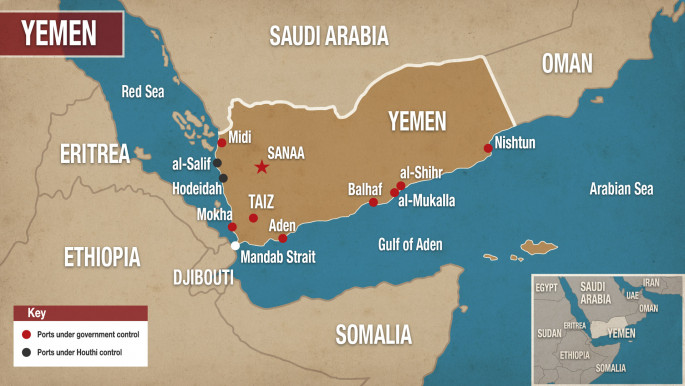Scores killed as clashes erupt on Yemen's coast
The renewed clashes in the coastal towns of Midi and Mokha, north and south of the major Red Sea port of Hodeidah respectively, erupted the day after government forces seized control of the area.
| Read more here: Yemen government forces recapture historical Red Sea city |
"The death toll this morning stands at 14 Houthi rebels and six troops" loyal to President Abedrabbo Mansour Hadi, a military source confirmed on condition of anonymity.
Hospital sources in Hodeidah confirmed at least eight dead.
Forces loyal to Yemen's president, backed by a Saudi-led Arab coalition, entered the historic port town of Mokha last month as part of a push to drive the Houthis out of the area.
Government forces had taken the docks of Mokha earlier in February and are now aiming to take the main port of Hodeidah, which is still under the control of Houthi rebels.
Prior to the government-backed military offensive, the Houthis had controlled nearly all of Yemen's 450 kilometre (280 mile) Red Sea coastline.
More than 400 combatants have been killed in the fight for coastal control.
 |
|
The conflict began after peaceful demonstrations calling for the downfall of the Saleh regime in 2011 were met with violent and often brutal responses. Ali Abdullah Saleh was given immunity and removed from power and replaced with Abdrabbuh Mansour Hadi.
In September 2014, the Houthi rebels, a group which Saleh had previously fought when in power, aligned with the ousted leader to bring down Hadi, a former VP and close confidante of Saleh.
In March 2015, a Saudi-led coalition launched a military campaign to help the internationally recognised government of Hadi regain control of territory lost to the Houthi rebels.
Figures suggest more than 10,000 people, half of which civilians, have died since this intervention, while three million more have been forced into displacement.
The conflict has also ravaged the country's economy and agricultural industry. Over 80 percent of Yemenis are currently in debt and 7.3 million of the country's population are classed by the UN as "severely food insecure".
Agencies contributed to this report





 Follow the Middle East's top stories in English at The New Arab on Google News
Follow the Middle East's top stories in English at The New Arab on Google News
![Israeli forces ordered bombed Gaza's Jabalia, ordering residents to leave [Getty]](/sites/default/files/styles/image_330x185/public/2176418030.jpeg?h=a5f2f23a&itok=_YGZaP1z)

